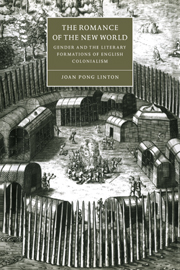Book contents
- Frontmatter
- Contents
- Acknowledgments
- Introduction
- 1 Love's laborers: the busy heroes of romance and empire
- 2 Sea-knights and royal virgins: American gold and its discontents in Lodge's A Margarite of America (1596)
- 3 Jack of Newbery and Drake in California: domestic and colonial narratives of English cloth and manhood
- 4 Eros and science: the discourses of magical consumerism
- 5 Gender, savagery, tobacco: marketplaces for consumption
- 6 Inconstancy: coming to Indians through Troilus and Cressida
- 7 The Tempest, “rape,” the art and smart of Virginian husbandry
- Coda: the masks of Pocahontas
- Notes
- Works cited
- Index
- Cambridge Studies in Renaissance Literature and Culture
3 - Jack of Newbery and Drake in California: domestic and colonial narratives of English cloth and manhood
Published online by Cambridge University Press: 06 November 2009
- Frontmatter
- Contents
- Acknowledgments
- Introduction
- 1 Love's laborers: the busy heroes of romance and empire
- 2 Sea-knights and royal virgins: American gold and its discontents in Lodge's A Margarite of America (1596)
- 3 Jack of Newbery and Drake in California: domestic and colonial narratives of English cloth and manhood
- 4 Eros and science: the discourses of magical consumerism
- 5 Gender, savagery, tobacco: marketplaces for consumption
- 6 Inconstancy: coming to Indians through Troilus and Cressida
- 7 The Tempest, “rape,” the art and smart of Virginian husbandry
- Coda: the masks of Pocahontas
- Notes
- Works cited
- Index
- Cambridge Studies in Renaissance Literature and Culture
Summary
In the course of the sixteenth century, the English cloth trade rose to domestic and international prominence through a shift from household to capitalist production. Thomas Deloney's prose romance, Jack of Newbery (1597), recapitulates this historic rise of the cloth trade in the personal achievements of the clothier John Winchcombe. As the trade continued to expand, cloth was among the first English products to arrive in the New World. In 1579, on his voyage around the world, Sir Francis Drake landed in California where he and his men were allegedly worshipped as gods for distributing English cloth to the Indians. This colonial episode first appeared in the 1589 edition of Richard Hakluyt's Principall Navigations. Both the prose romance and the colonial narrative are promotions for the cloth trade. But at the same time, cloth can be said to “make” the Englishman by giving him two faces: as producer at home and colonist in America. In focusing on Winchcombe and Drake – “‘ founding” figures in the domestic and colonial enterprises – the stories of cloth are in fact stories of an ideal bourgeois manhood elaborated through the economics and politics of cloth-making.
If we realize that both Deloney and Hakluyt had ties to the Clothworkers of London (a confederation of clothiers and tradesmen in various finishing crafts), the relation of cloth and manhood becomes a historically specific one. A silk-weaver by profession, Deloney was active within this economic network, and “many of his works show him to be a willing, or perhaps even a hired, spokesman for the clothiers of England.”
- Type
- Chapter
- Information
- The Romance of the New WorldGender and the Literary Formations of English Colonialism, pp. 62 - 83Publisher: Cambridge University PressPrint publication year: 1998



